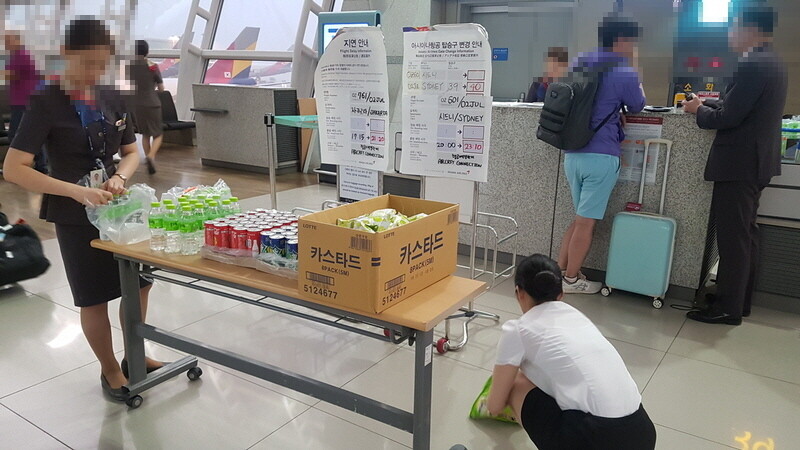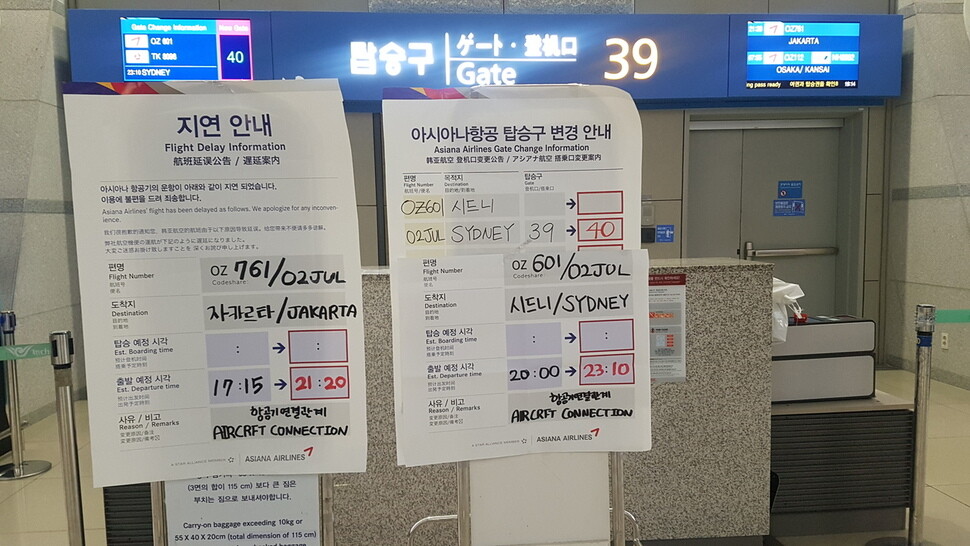hankyoreh
Links to other country sites 다른 나라 사이트 링크
[Editorial] Backward, nepotistic practices behind Asiana’s in-flight meal crisis

Asiana Airlines is in big trouble over in-flight meals. Since July 1, dozens of flights have been delayed because the meals did not arrive on time, and a number of planes have even taken off without any meals onboard. It’s astonishing to think that flights could be delayed not because of poor weather but because of in-flight meals. This is reportedly the first time that planes have taken off without any food aboard since Incheon Airport opened in 2001. In a tragic turn of events, the president of a subcontractor to the meal supplier ended his life – he had been under immense pressure about the delayed meals, friends explained.
From beginning to end, the in-flight meal debacle has exhibited one absurdity after another. Sources in the aviation industry blame the affair on Asiana’s unwise shuffle of its meal supplier. Since 2003, Asiana had worked with LSG Sky Chefs, an in-flight meal supplier affiliated with Germany’s Lufthansa Group, and extended the contract every five years. But last year, Asiana asked LSG to purchase 160 billion won (US$143,229,920) in bonds with warrants issued by Kumho Buslines, the Kumho Asiana Group’s holding company, in exchange for Asiana renewing the contract.
When the supplier refused, Asiana decided to terminate its contract as of this June. LSG has filed a complaint against Asiana with South Korea’s Fair Trade Commission. Asiana asserts that it ended the contract because of issues with the quality and price of LSG’s meals. But the parent company of Gate Gourmet – the Chinese company with which Asiana ended up signing a contract – is the HNA Group (which owns China’s Hainan Airlines), which agreed to Asiana’s request for investment.
Asiana set up a joint venture with Gate Gourmet in Oct. 2017 and built a factory with the goal of supplying in-flight meals by this July, but these plans were upset by a fire this past March. This is leading some to trace the whole affair to the rash decision to change the meal supplier in order to secure the funds needed for Park Sam-koo, chairman of the Kumho Asiana Group, to regain control of Kumho Tire. In effect, the company was harmed in the owner’s interest.

And though there was enough time even after the fire, a lackluster response made the situation even worse. Asiana signed a contract with Sharp DO&CO, a small South Korean company, to supply in-flight meals on a temporary basis, beginning in July and lasting for three months. But there were concerns that a company that was accustomed to supplying around 3,000 meals a day might not be able to meet Asiana’s demand for 20,000 or 30,000 meals. In the end, those fears became reality.
Even as passengers’ inconvenience dragged on and the public erupted with criticism, Asiana stayed mum until July 3, when Kim Soo-cheon, the company’s president, belatedly posted an apology to the company website. That hardly suggests that customers are treated with respect. Given the ongoing scandal involving the family of Cho Yang-ho, chairman of Korean Air, you can’t help wondering whether any lessons have been learned.
Meanwhile, a scandal is also brewing over the “parachute” appointment (a term used to describe nepotistic practices) of Park Sae-jin – daughter of Park Sam-koo – as senior vice president of Kumho Resort. Despite not having a whit of managerial experience, Sae-jin snagged a managing director position simply because she is the daughter of the group’s owner. The in-flight meal debacle is surely connected to such a backward and nepotistic approach to management. It’s just one more reminder why reform is needed at South Korea’s chaebols.
Please direct comments or questions to [english@hani.co.kr]

Editorial・opinion
![[Column] Has Korea, too, crossed the Rubicon on China? [Column] Has Korea, too, crossed the Rubicon on China?](https://flexible.img.hani.co.kr/flexible/normal/500/300/imgdb/original/2024/0419/9317135153409185.jpg) [Column] Has Korea, too, crossed the Rubicon on China?
[Column] Has Korea, too, crossed the Rubicon on China?![[Correspondent’s column] In Japan’s alliance with US, echoes of its past alliances with UK [Correspondent’s column] In Japan’s alliance with US, echoes of its past alliances with UK](https://flexible.img.hani.co.kr/flexible/normal/500/300/imgdb/original/2024/0419/2317135166563519.jpg) [Correspondent’s column] In Japan’s alliance with US, echoes of its past alliances with UK
[Correspondent’s column] In Japan’s alliance with US, echoes of its past alliances with UK- [Editorial] Does Yoon think the Korean public is wrong?
- [Editorial] As it bolsters its alliance with US, Japan must be accountable for past
- [Guest essay] Amending the Constitution is Yoon’s key to leaving office in public’s good graces
- [Editorial] 10 years on, lessons of Sewol tragedy must never be forgotten
- [Column] A death blow to Korea’s prosecutor politics
- [Correspondent’s column] The US and the end of Japanese pacifism
- [Guest essay] How Korea turned its trainee doctors into monsters
- [Guest essay] As someone who helped forge Seoul-Moscow ties, their status today troubles me
Most viewed articles
- 1[Column] The clock is ticking for Korea’s first lady
- 2Samsung barricades office as unionized workers strike for better conditions
- 3After 2 months of delayed, denied medical care, Koreans worry worst may be yet to come
- 4[Correspondent’s column] In Japan’s alliance with US, echoes of its past alliances with UK
- 5[Column] Has Korea, too, crossed the Rubicon on China?
- 6Hong Se-hwa, voice for tolerance whose memoir of exile touched a chord, dies at 76
- 7[Photo] Smile ambassador, you’re on camera
- 8All eyes on Xiaomi after it pulls off EV that Apple couldn’t
- 9[Guest essay] How Korea turned its trainee doctors into monsters
- 10US overtakes China as Korea’s top export market, prompting trade sanction jitters